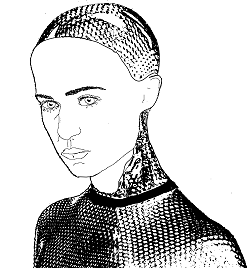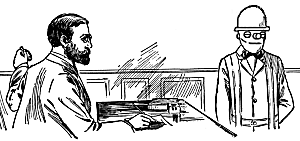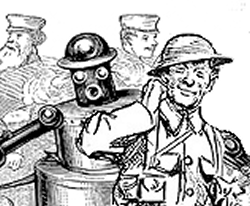 I finally saw Ex Machina, which everyone has been telling me is the first film about artificial intelligence you can take seriously. Competition in that area is not intense, of course: many films about robots and conscious computers are either deliberately absurd or treat the robot as simply another kind of monster. Even the ones that cast the robots as characters in a serious drama are essentially uninterested in their special nature and use them as another kind of human, or at best to make points about humanity. But yes: this one has a pretty good grasp of the issues about machine consciousness and even presents some of them quite well, up to and including Mary the Colour Scientist. (Spoilers follow.)
I finally saw Ex Machina, which everyone has been telling me is the first film about artificial intelligence you can take seriously. Competition in that area is not intense, of course: many films about robots and conscious computers are either deliberately absurd or treat the robot as simply another kind of monster. Even the ones that cast the robots as characters in a serious drama are essentially uninterested in their special nature and use them as another kind of human, or at best to make points about humanity. But yes: this one has a pretty good grasp of the issues about machine consciousness and even presents some of them quite well, up to and including Mary the Colour Scientist. (Spoilers follow.)
If you haven’t seen it (and I do recommend it), the core of the story is a series of conversations between Caleb, a bright but naive young coder, and Ava, a very female robot. Caleb has been told by Nathan, Ava’s billionaire genius creator, that these conversations are a sort of variant Turing Test. Of course in the original test the AI was a distant box of electronics: here she’s a very present and superficially accurate facsimile of a woman. (What Nathan has achieved with her brain is arguably overshadowed by the incredible engineering feat of the rest of her body. Her limbs achieve wonderful fluidity and power of movement, yet they are transparent and we can see that it’s all achieved with something not much bigger than a large electric cable. Her innards are so economical there’s room inside for elegant empty spaces and decorative lights. At one point Nathan is inevitably likened to God, but on anthropomorph engineering design he seems to leave the old man way behind.)
Why does she have gender? Caleb asks, and is told that without sex humans would never have evolved consciousness; it’s a key motive, and hell, it’s fun. In story terms making Ava female perhaps alludes to the origin of the Turing Test in the Imitation Game, which was a rather camp pastime about pretending to be female played by Turing and his friends. There are many echoes and archetypes in the film; Bluebeard, Pygmalion, Eros and Psyche to name but three; all of these require that Ava be female. If I were a Jungian I’d make something of that.
There’s another overt plot reason, though; this isn’t really a test to determine whether Ava is conscious, it’s about whether she can seduce Caleb into helping her escape. Caleb is a naive girl-friendless orphan; she has been designed not just as a female but as a match for Caleb’s preferred porn models (as revealed in the search engine data Nathan uses as his personal research facility – he designed the search engine after all). What a refined young Caleb must be if his choice of porn revolves around girls with attractive faces (on second thoughts, let’s not go there).
We might suspect that this test is not really telling us about Ava, but about Caleb. That, however, is arguably true of the original Turing Test too. No output from the machine can prove consciousness; the most brilliant ones might be the result of clever tricks and good luck. Equally, no output can prove the absence of consciousness. I’ve thought of entering the Loebner prize with Swearbot, which merely replies to all input with “Shut the fuck up” – this vividly resembles a human being of my acquaintance.
There is no doubt that the human brain is heavily biased in favour of recognising things as human. We see faces in random patterns and on machines; we talk to our cars and attribute attitudes to plants. No doubt this predisposition made sense when human beings were evolving. Back then, the chances of coming across anything that resembled a human being without it being one were low, and given that an unrecognised human might be a deadly foe or a rare mating opportunity the penalties for missing a real one far outweighed those for jumping at shadows or funny-shaped trees now and then.
Given all that, setting yourself the task of getting a lonely young human male romantically interested in something not strictly human is perhaps setting the bar a bit low. Naked shop-window dummies have pulled off this feat. If I did some reprogramming so that the standard utterance was a little dumb-blonde laugh followed by “Let’s have fun!” I think even Swearbot would be in with a chance.
I think the truth is that to have any confidence about an entity being conscious, we really need to know something about how it works. For human beings the necessary minimum is supplied by the fact that other people are constituted much the same way as I am and had similar origins, so even though I don’t know how I work, it’s reasonable to assume that they are similar. We can’t generally have that confidence with a machine, so we really need to know both roughly how it works and – bit of a stumper this – how consciousness works.
Ex Machina doesn’t have any real answers on this, and indeed doesn’t really seek to go much beyond the ground that’s already been explored. To expect more would probably be quite unreasonable; it means though, that things are necessarily left rather ambiguous.
It’s a shame in a way that Ava resembles a real woman so strongly. She wants to be free (why would an AI care, and why wouldn’t it fear the outside world as much as desire it?), she resents her powerlessness; she plans sensibly and even manipulatively and carries on quite normal conversations. I think there is some promising scope for a writer in the oddities that a genuinely conscious AI’s assumptions and reasoning would surely betray, but it’s rarely exploited; to be fair Ex Machina has the odd shot, notably Ava’s wish to visit a busy traffic intersection, which she conjectures would be particularly interesting; but mostly she talks like a clever woman in a cell. (Actually too clever: in that respect not too human).
At the end I was left still in doubt. Was the take-away that we’d better start thinking about treating AIs with the decent respect due to a conscious being? Or was it that we need to be wary of being taken in by robots that seem human, and even sexy, but in truth are are dark and dead inside?


